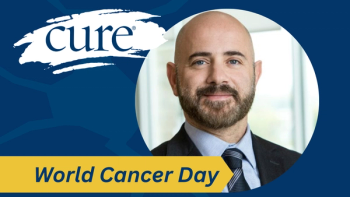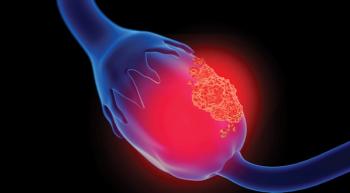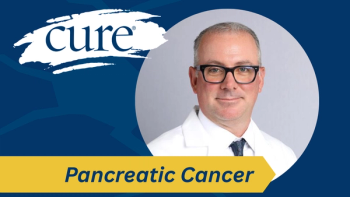
FDA expands access to CAR-T cell therapy for patients with relapsed or refractory PCNSL.

Spencer, Assistant Editor of CURE®, has been with MJH Life Sciences since 2024. A graduate of Rowan University with a bachelor's degree in health communication, Spencer manages CURE's Facebook, Instagram and YouTube. He also enjoys spending time with family and friends, hiking, playing guitar and rock climbing.

FDA expands access to CAR-T cell therapy for patients with relapsed or refractory PCNSL.

Relacorilant plus Abraxane improved overall survival by 4.1 months without added toxicity and no biomarker testing in ROSELLA.

Dr. Joshua Sabari tells CURE that surgery, radiation and systemic therapy can affect the lungs, and he urges exercise and reporting new symptoms early.

Dietitians share a fiber- and protein-rich pastina bean soup to help patients with colorectal cancer stay nourished and manage GI symptoms during treatment.

After a brain cancer diagnosis, Dr. Bobby Mukkamala says becoming a patient highlighted care barriers, emotions and the need for access and support.

Dr. Obeid says genetics and ongoing monitoring guide treatment and survivorship helping patients and families plan ahead and detect recurrence earlier.

An expert explains FDA-approved Lymphir for relapsed or refractory CTCL, noting 36% response rate, manageable side effects and fast relief from itching.

Lung carcinoid tumors are rare and often slow growing. Treatment depends on stage and tumor type, with surgery common early and systemic options for advanced disease.

The FDA accepted an application for ivonescimab with chemotherapy for patients with lung cancer driven by EGFR changes after prior targeted treatment.

Patients with recurrent or progressive high-grade meningioma had encouraging responses to Verzenio in a phase 2 trial.

Small cell lung cancer grows quickly. Learn how it’s diagnosed, staged and treated, and what patients can expect from therapies and side effects.

Patients should understand their cancer, treatment goals and options and record questions to support informed, productive discussions with care teams.

FDA granted breakthrough therapy designation to sofetabart mipitecan for adults with platinum-resistant ovarian, fallopian tube or primary peritoneal cancer.

Long-term CATNON trial results show radiotherapy followed by adjuvant temozolomide extends survival in patients with newly diagnosed anaplastic glioma.

Outpatient CD19 CAR-NK plus rituximab led to complete remissions up to 15 months in patients with Waldenström Non-Hodgkin lymphoma.

Dr. Benjamin Jon Golas outlines pancreatic cancer care, including surgery, chemotherapy, radiation and emerging targeted therapies at specialized centers.

An expert explains how a DLL3 blood test may help guide Imdelltra use and set expectations for patients with small cell lung cancer.

The FDA granted orphan drug designation to LP-284 for soft tissue sarcomas, supporting development of the investigational therapy for patients with cancer.

A U.S. phase 1 trial of Alveltamig opened at UK Markey, where the first patient with small cell lung cancer was treated in late October.

Nutritional support helps malnourished patients with advanced gastric cancer maintain chemotherapy and may extend time to treatment failure.

Dr. Ian Flinn explains how subcutaneous Lunsumio VELO uses bispecific antibodies for quick, durable treatment in relapsed/refractory follicular lymphoma.

The U.S. FDA has accepted a supplemental application for Besremi in adults with essential thrombocythemia with an Aug. 30, 2026 action date.

Lung squamous cell carcinoma starts in airway lining cells; treatment depends on stage, from surgery to systemic therapies, with side effects to monitor.

2025 brought key advances in blood cancer treatment, research, and patient insights across multiple myeloma, lymphoma, leukemia and MDS.

The FDA granted orphan drug designation to CK0804, an investigational cell therapy being studied for patients with myelofibrosis.

From kidney to prostate cancer, these 2025 stories highlight research, new treatments and resources helping patients and caregivers stay informed and engaged.

From new imaging and targeted therapies to patient journeys, 2025 highlighted key advances and personal stories in lung cancer care and awareness.

Adding Monjuvi and Revlimid to standard chemotherapy helped patients with newly diagnosed lymphoma live longer without disease worsening.

From hair regrowth to safe pregnancy chemotherapy and new targeted therapies, these top five breast cancer stories of 2025 highlight patient care advances.

Diagnosed with myeloma in 2017, Oya Gilbert highlights self-advocacy, emotional well-being and culturally relevant outreach for underserved patients.

Published: August 22nd 2025 | Updated: August 25th 2025

Published: February 5th 2025 | Updated: May 19th 2025

Published: December 6th 2025 | Updated:

Published: March 28th 2025 | Updated:

Published: November 11th 2025 | Updated:

Published: March 12th 2025 | Updated: